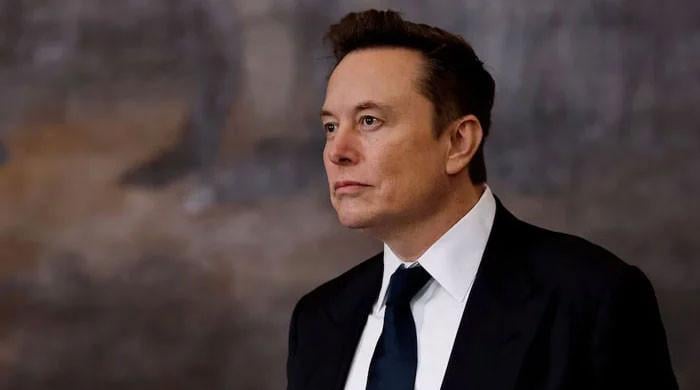Over 50 nations want to start trade talks with US after tariffs, Trump officials say
Trump shared video that suggest his tariffs aimed to hammer stock market on purpose in bid to force lower interest rates
April 06, 2025

- Trump officials defend tariffs after rocky rollout.
- Hassett denies tariffs part of Trump plan to crash markets.
- Officials highlight leverage with other nations.
More than 50 nations have reached out to the White House to begin trade talks since US President Donald Trump rolled out sweeping new tariffs, top officials said on Sunday as they defended levies that wiped out nearly $6 trillion in value from US stocks last week and downplayed economic fallout.
On Sunday morning talk shows, Trump's top economic advisers sought to portray the tariffs as a savvy repositioning of the US in the global trade order. They also tried to minimise the economic fallout from last week's tumultuous rollout, ahead of Monday's expected bumpy opening of Asian stock markets.
Treasury Secretary Scott Bessent said more than 50 nations had started negotiations with the US since last Wednesday's announcement, putting Trump in a position of power.
Neither Bessent nor the other officials named the countries or offered details about the talks. However, holding simultaneous negotiations with so many countries at once could potentially pose a huge logistical challenge for the Trump administration. It is not clear how long such talks would last.
Taiwan's President Lai Ching-te on Sunday offered zero tariffs as the basis for talks with the US, pledging to remove trade barriers and saying Taiwanese companies will raise their US investments.
"He's created maximum leverage for himself," Bessent said on NBC News' 'Meet the Press.'
Bessent downplayed the stock market drop and said there was "no reason" to anticipate a recession based on the tariffs, citing stronger-than-anticipated US jobs growth.
"We could see from the jobs number on Friday, that was well above expectations, that we are moving forward, so I see no reason that we have to price in a recession," Bessent said.
Trump jolted economies around the world after he announced broad tariffs on US imports, triggering retaliatory levies from China and sparking fears of a global trade war and recession.
US stocks tumbled by around 10% in the two days since Trump announced a new global tariff regime that was more aggressive than analysts and investors had been anticipating.
Analysts and large investors blamed the stock market drop on Trump's tariff push, which most economists and the head of the US Federal Reserve believe risk stoking inflation and damaging economic growth. JPMorgan economists now estimate the tariffs will result in full-year gross domestic product declining by 0.3%, down from an earlier estimate of 1.3% growth, and that the unemployment rate will climb to 5.3% from 4.2% now.
Unified front
Tariff-stunned markets face another week of potential turmoil after the worst week for US stocks since the onset of the COVID-19 crisis five years ago.
The S&P 1500 Composite Index, among the widest measures of the US market, lost nearly $6 trillion in value in the two days after Trump's announcement, and has had almost $10 trillion wiped out since mid-February, a significant blow to millions of Americans' retirement nest eggs.
During an interview on ABC News' 'This Week,' US National Economic Council Director Kevin Hassett denied that the tariffs were part of a Trump strategy to crash financial markets to pressure the US Federal Reserve to cut interest rates, saying there would be no "political coercion" of the central bank.
In a Truth Social post on Friday, Trump shared a video that suggested his tariffs aimed to hammer the stock market on purpose in a bid to force lower interest rates.
The social media post fueled global debate over whether Trump's tariffs were part of a permanent new tariff regime or simply a negotiating tactic that could lead to the tariffs being eased through concessions by other countries.
Commerce Secretary Howard Lutnick suggested on CBS News' 'Face the Nation' that they could be the latter, saying the tariffs would remain in place "for days and weeks." He said the reciprocal tariffs would be rolled out as planned on April 9.
The process used to determine the tariffs came under scrutiny last week after they were applied to uninhabited Antarctic islands populated by penguins and other tiny, remote places.
Lutnick said a comprehensive approach was needed so that small nations could not be used by larger countries to circumvent the tariffs.
"Basically (Trump) said, 'I can't let any part of the world be a place where China or other countries can ship through them,'" Lutnick said.
Billionaire Elon Musk, a Trump adviser, said on Saturday he hoped in future to see complete freedom of trade between the US and Europe.
Peter Navarro, a Trump trade adviser, dismissed the idea of a rift between Musk and the Trump administration over the tariff policy but said the Tesla CEO was looking out for his business interests.
"There is no rift here," Navarro told Fox News' 'Sunday Morning Futures.'











